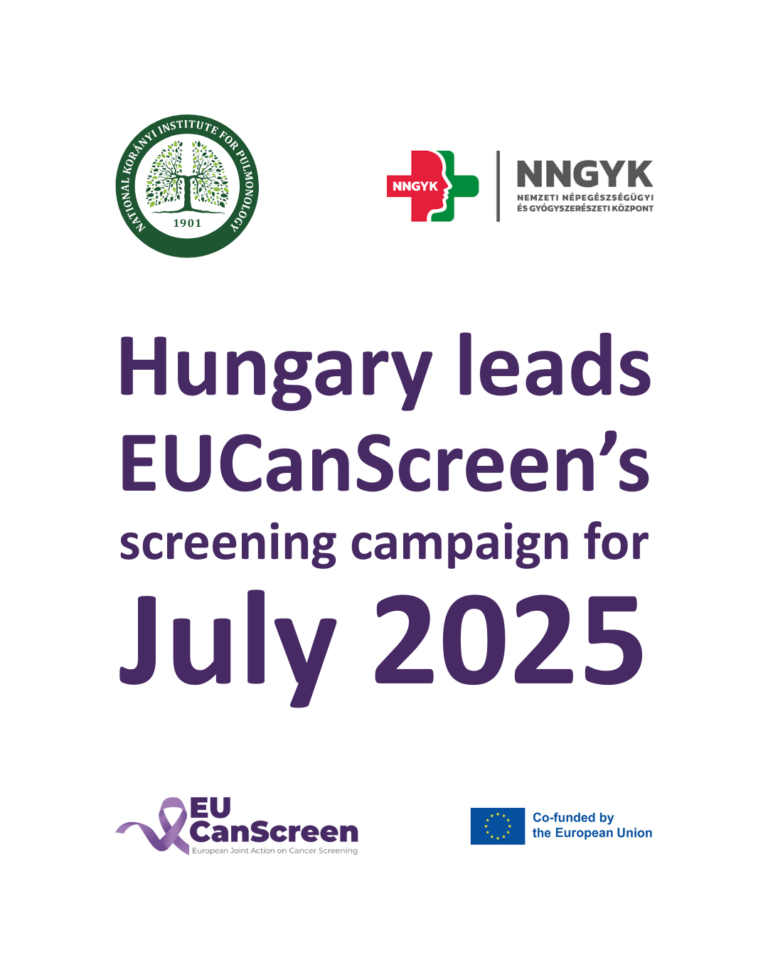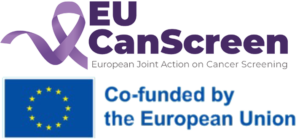Hungary in the EUCanScreen Spotlight – July 2025

In July 2025, Hungary takes the spotlight in the EUCanScreen project, highlighting its commitment to the development and implementation of high-quality, evidence-based cancer screening programmes. As one of the participating countries in this joint action, Hungary contributes both strategic direction and practical expertise to the advancement of population-based screening across Europe.
Two national institutions play a central role in this work: the National Korányi Institute of Pulmonology (NKIP), acting as Competent Authority and Beneficiary, and the National Centre for Public Health and Pharmacy (NCPHP). Together, they are helping to build a more effective, inclusive, and sustainable screening system—especially in emerging areas such as low-dose CT (LDCT) lung cancer screening. Under the coordination of NKIP, a new regional LDCT training centre is being established in Hungary, including 10 digital workstations, to support hands-on, on-site training for professionals involved in lung cancer screening.
The Role of the National Korányi Institute of Pulmonology in Lung Cancer Screening and the Development of Public Health Screening
The National Korányi Institute of Pulmonology (NKIP) is Hungary’s leading respiratory care institution, with nationwide responsibility for the prevention, early detection, diagnosis, treatment, and rehabilitation of respiratory diseases. Its mission is to preserve the population’s health and improve quality of life by delivering high-quality, science-based pulmonary care.
NKIP plays a key role in designing and advancing Hungary’s national public health lung cancer screening programme. From establishing the technical foundation for low-dose CT-based screening to developing protocols and organizing care pathways, it is actively engaged in building a comprehensive screening system. In addition to its involvement in protocol development, the institute—also serving as the national methodological centre for LDCT screening—contributes to programme evaluation, improving access for target populations, and encouraging participation.
The Korányi Institute’s multidisciplinary approach, clinical expertise, and strong scientific background make it a reliable partner in international collaborations aimed at enhancing the effectiveness of lung cancer screening—such as the EUCanScreen project—and in adapting and applying best practices at the national level.
Its goal is to reduce lung cancer mortality through early detection, improve survival outcomes, and contribute to increasing the number of healthy life years both in Hungary and across Europe.
The role of the National Center for Public Health and Pharmacy and the Screening Coordination Department in public health screenings
The National Center for Public Health and Pharmacy is one of Hungary’s central health authorities, responsible for protecting public health, preventing diseases, and coordinating pharmaceutical and public health tasks. The institution plays a key role in implementing public health strategies, with particular emphasis on organized population-based screenings.
Within the institution, the Screening Coordination Department – which is also actively involved in the EUCanScreen project – is responsible for the national-level professional coordination and management of cervical, breast and colorectal cancer screenings. The department develops methodological guidelines and professional protocols for the screenings, participates in organizational and evaluation processes, as well as in analysing participation data and improving the system.
Furthermore, a key task of the department is to provide targeted information to the population and to facilitate access to screening tests. These efforts support the early detection of cancer, reduce preventable mortality, and increase the number of years lived in good health.
|
#LungCancerScreening#LDCT#PublicHealth#CancerPrevention#EarlyDetection
🔗 Please don’t forget to Subscribe to EuCanScreen Newsletter! 💪
Subscribe to our newsletter to get news and updates.
Subscribe to our newsletter to get news and updates.

The general objective of EUCanScreen is to assure sustainable implementation of high-quality screening for breast, cervical and colorectal cancers, as well as implementation of the recently recommended screening programs – for lung, prostate and gastric cancers. EUCanScreen will facilitate the reduction of cancer burden and achieving equity across the EU.
This project has received funding from the European Union’s EU4HEALTH Programme under the Grant Agreement no 101162959











